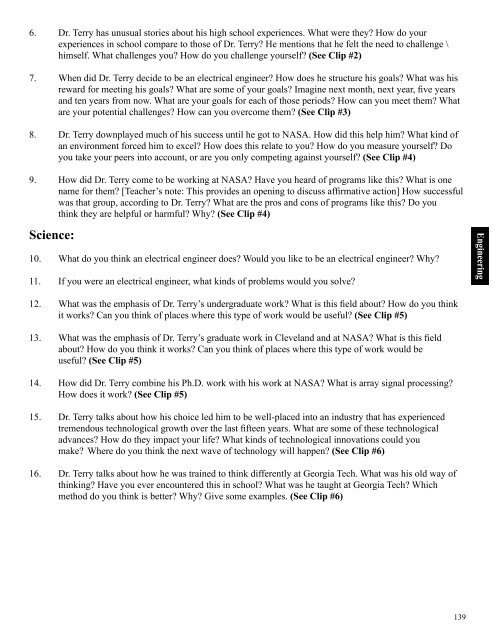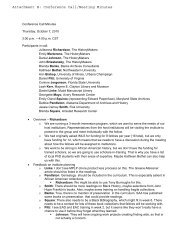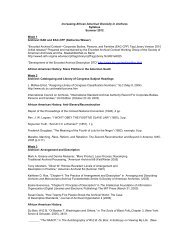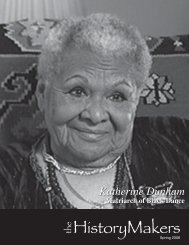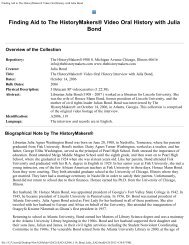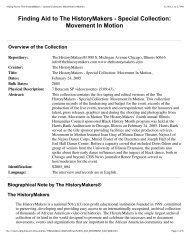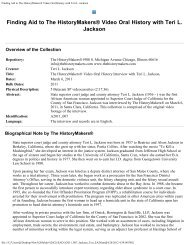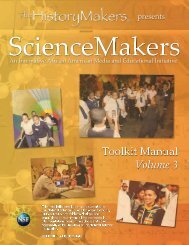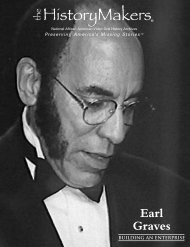ScienceMakers Toolkit Manual - The History Makers
ScienceMakers Toolkit Manual - The History Makers
ScienceMakers Toolkit Manual - The History Makers
Create successful ePaper yourself
Turn your PDF publications into a flip-book with our unique Google optimized e-Paper software.
6. Dr. Terry has unusual stories about his high school experiences. What were they? How do your<br />
experiences in school compare to those of Dr. Terry? He mentions that he felt the need to challenge \<br />
himself. What challenges you? How do you challenge yourself? (See Clip #2)<br />
7. When did Dr. Terry decide to be an electrical engineer? How does he structure his goals? What was his<br />
reward for meeting his goals? What are some of your goals? Imagine next month, next year, fi ve years<br />
and ten years from now. What are your goals for each of those periods? How can you meet them? What<br />
are your potential challenges? How can you overcome them? (See Clip #3)<br />
8. Dr. Terry downplayed much of his success until he got to NASA. How did this help him? What kind of<br />
an environment forced him to excel? How does this relate to you? How do you measure yourself? Do<br />
you take your peers into account, or are you only competing against yourself? (See Clip #4)<br />
9. How did Dr. Terry come to be working at NASA? Have you heard of programs like this? What is one<br />
name for them? [Teacher’s note: This provides an opening to discuss affi rmative action] How successful<br />
was that group, according to Dr. Terry? What are the pros and cons of programs like this? Do you<br />
think they are helpful or harmful? Why? (See Clip #4)<br />
Science:<br />
10. What do you think an electrical engineer does? Would you like to be an electrical engineer? Why?<br />
11. If you were an electrical engineer, what kinds of problems would you solve?<br />
12. What was the emphasis of Dr. Terry’s undergraduate work? What is this fi eld about? How do you think<br />
it works? Can you think of places where this type of work would be useful? (See Clip #5)<br />
13. What was the emphasis of Dr. Terry’s graduate work in Cleveland and at NASA? What is this fi eld<br />
about? How do you think it works? Can you think of places where this type of work would be<br />
useful? (See Clip #5)<br />
14. How did Dr. Terry combine his Ph.D. work with his work at NASA? What is array signal processing?<br />
How does it work? (See Clip #5)<br />
15. Dr. Terry talks about how his choice led him to be well-placed into an industry that has experienced<br />
tremendous technological growth over the last fi fteen years. What are some of these technological<br />
advances? How do they impact your life? What kinds of technological innovations could you<br />
make? Where do you think the next wave of technology will happen? (See Clip #6)<br />
16. Dr. Terry talks about how he was trained to think differently at Georgia Tech. What was his old way of<br />
thinking? Have you ever encountered this in school? What was he taught at Georgia Tech? Which<br />
method do you think is better? Why? Give some examples. (See Clip #6)<br />
139<br />
Engineering


